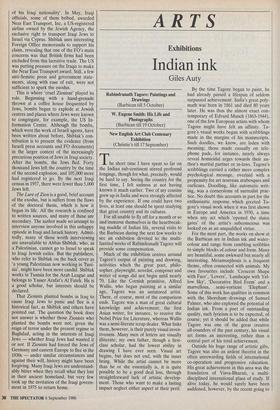Jewish exiles in Israel
Charles Glass
THE LURE OF ZION: THE CASE OF THE IRAQI JEWS by Abbas Shiblak
Al Saqi Books, f4.95
The Jews of Iraq, almost alone among their co-religionists outside Palestine, were not part of the Diaspora created in 70 AD when Titus destroyed the Temple. Their ancestors had chosen six centuries earlier, after Cyrus had conquered Babylon and granted Jews the right to return to Jeru- salem, to remain in the land between the rivers. There they wrote the Babylonian Talmud, and there they prospered. By the first half of this century, when Jews in Europe were suffering anti-Semitic persecution, they formed one of Iraq's wealthiest and most dynamic communities. In 1939, ten of the 25 'first class' members of the Baghdad Chamber of Commerce (those whose wealth was between 22,500 and 75,000 Iraqi Dinars) were Jews. (Only one was an Arab Muslim.) Prominent Baghdad Jewish families maintained houses and trading establishments in Lon- don, Manchester, Bombay, Hong Kong and Shanghai. Iraq's Sassoon family were known as the aothschilds of the East'. Jews formed a vital part of the civil service and constituted a majority among em- ployees of the railways, Basra port and the Iraq Petroleum Company.
Jews were no less conspicuous in Iraqi cultural life, writing plays and books in Arabic. Jews founded five of Iraq's Arabic language newspapers. Jewish men had a literacy rate of 83 per cent, compared to 15 per cent • for the Iraqi population as a whole. (They were literate in Arabic, speaking neither Ladino, the lingua franca of Sephardim, nor Yiddish, that of the Ashkenazim.) Thirty-two Jewish musicians were listed among the country's top one hundred. The Jewish Chronicle wrote of the Iraqi Jews, who with 114,000 people outnumbered Christians, in December 1949,
they are attached to their homes, traditions and their shrines of the prophets, and would not like to leave them in order to begin life once more in an immigrants' camp in Israel, where they believe people are not particular- ly friendly to oriental Jews.
By the end of 1952, nearly all Iraq's Jews did leave 'their homes, traditions and their shrines of the prophets', most of them to begin life in an immigrants' camp in Israel. Abbas Shiblak's task in The Lure of Zion is to explain why they left. Their departure was not the result of traditional Arab anti-Semitism. There had been one pog- rom, called the Farhud, against Jews in Baghdad, but that took place in 1941, ten years before the exodus of Iraqi Jews began. Shiblak writes that the Arabs who looted Jewish houses and shops and caused an estimated 300 Jewish casualties were reacting to public Jewish support for a British expeditionary force, including Jew- ish units from Palestine, which came to put down an Arab nationalist and fascist revolt by Iraqi army officers. So there was a specific cause. The events of the Farhud were not repeated.
Iraqi Jews were not strongly attracted to Zionism before the establishment of Israel in 1948. Only 8,000 Iraqi Jews emigrated to Palestine in all the years between the Balfour Declaration and the creation of the Jewish State, fewer, in fact, than had gone to India to work in trade. On the other hand, many Jews were active in Iraqi nationalist and communist politics and in the Anti-Zionist League, which was estab- lished as a front for the Iraqi communist party in 1946. When a Jewish youth, Shamran Olwan, was killed by police during a demonstration, the Arab national- ist newspaper al-Yaqtha called him 'a martyr of the Iraqi people in their fight for freedom'.
The association of communism with Iraq's Jews, combined with the success of Zionism in the 1948 war, led the govern- ment and many Iraqi Arabs to question the loyalty of Jews to their Iraqi homeland. The same al-Yaqtha which praised a Jewish martyr in 1946 was by 1948 referring to Israel as a 'communist plot against the Arabs' and warning against the 'economic slavery and domination imposed by the Jewish minority' in Iraq. At the same time, American and Israeli officials were looking for a solution to the dispossession of Palestine's Arabs in the form of a 'popula- tion transfer' between Israel and the Arab states: the Arab world would accept Palestinian Arab refugees, and Israel would accept Jews from the Arab world. There were only two problems with this solution, suggested even by humane Amer- icans like Herbert Hoover: Palestine's Arab refugees wanted to return to Pales- tine, and many of the Jews of the Arab world, especially those in Iraq, wanted to stay where they were.
Things moved quickly in the first three years of the 1950s. In March 1950, Iraq passed a denaturalisation law which dep- rived 'any Iraqi who wished, of his own free will and choice, to leave Iraq for good, of his Iraqi nationality'. In May, Iraqi officials, some of them bribed, awarded Near East Transport, Inc, a US-registered airline owned by the Jewish Agency, the exclusive right to transport Iraqi Jews to Israel via Cyprus. Shiblak uses interesting Foreign Office memoranda to support his claim, revealing that one of the FO's main concerns was that British firms had been excluded from this lucrative trade. The US was putting pressure on the Iraqis to make the Near East Transport award. Still, a few anti-Semitic press and government state- ments, along with ease of exit, were not sufficient to spark the exodus.
This is where 'cruel Zionism' played its role. Beginning with a hand-grenade thrown at a coffee house frequented by Jews, bombs began to explode at Jewish centres and places where Jews were known to congregate, for example, the US In- formation Centre. Although the bombs, which were the work of Israeli agents, have been written about before, Shiblak's con- tribution is to present the evidence (from Israeli press accounts and FO documents) in the larger context of the increasingly precarious position of Jews in Iraqi society. After the bombs, the Jews fled. Forty thousand Jews left the country by the time of the second explosion, and 105,000 more had registered to go. By the next Iraqi census in 1957, there were fewer than 5,000 Jews left.
The Lure of Zion is a good, brief account of the exodus, but is suffers from the flaws of the doctoral thesis, which is how it began its life. All the research is confined to written sources, and many of these are secondary. The author made no attempt to interview anyone involved in this unhappy episode in Iraqi and Israeli history. Admit- tedly, many of those worth interviewing are unavailable to Abbas Shiblak, who, as a Palestinian, cannot go to Israel to speak to Iraqi Jewish exiles. But the publishers, who refer to Shiblak on the back cover as 'a young Palestinian now working in Tuni- sia', might have been more candid. Shiblak works in Tunisia for the Arab League and belongs to Yasser Arafat's Al Fateh. He is a good scholar, but interests should be declared.
That Zionists planted bombs in Iraq to cause Iraqi Jews to panic and flee is a historical fact, as Shiblak and others have pointed out. The question the book does not answer is whether those Zionists who planted the bombs were not, given the reign of terror under the present regime in Baghdad, acting in the interests of Iraqi Jews — whether Iraqi Jews had wanted it or not. If Zionists had forced the Jews of Germany and eastern Europe to flee in the 1930s — under similar circumstances and against their will, history might have been forgiving. Many Iraqi Jews are understand- ably bitter when they recall what they lost in their ancient homeland, but very few took up the invitation of the Iraqi govern- ment in 1975 to return home.







































 Previous page
Previous page